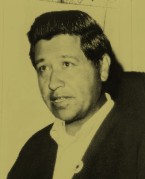San Francisco Organizing works behind the scenes, normally, so it was unsettling in one week to read a four-part series in the Los Angeles Times looking behind the curtains at the legacy of Cesar Chavez and another hard piece on the east coast looking at the problems of the King family in Atlanta.
The King articles were timed to the holiday. They opened the window to the internal struggle within the family for control of the King legacy with some of the children pulling one way and some the other, while the Park Service tried separately to get site control of what has become a popular Atlanta attraction with over 600,000 visitors annually. There was a hint of noses upturned in the article about licensing the King image and speeches for commercial reasons and whether or not that was appropriate depending on which side of the internal family dispute you chose. Reasonable people can disagree on some of these matters of where exactly one draws the line on proprietary questions for public figures. Martin Luther King is one of the rare treasures of our time as a moral figure with special meaning across the broad range of the American people and the world, yet the family certainly has a say when you are talking about a husband and father. Where do you draw the line?
The UFW series was more disturbing. There were insinuations about whether the Chavez family was involved in self-dealing and whether or not housing and other developments were appropriately affordable for lower income farm workers, but most of these were glancing shots that ricocheted off the targets. Furthermore, friends in California close to the UFW assure me that the housing programs are deeply supported and in great demand by farm workers and their communities. We also know how difficult it is to develop affordable housing, so we would be very careful about throwing rocks in that house.
What was more troubling was the stark reality that the UFW is down to only 7000 members in the fields and that the 30 year decline may have flowed straight from the founder to this date. The story peeled back shades and exposed internal disputes and conflicts from 25-30 years ago that tore the organization apart. Most of these stories were pretty well known by long time practitioners in this work, but kept to ourselves in the way we all automatically protect the work against enemies and outsiders. The question of whether or not Chavez himself was stable during that period or had lost his bearings was the question drawn by the article. At one level one simply has to say, one would have had to have been there to know for sure.
The question for our time that still has resonance without resolution was a throwaway line in the LA Times. Was Chavez really right or wrong to want to build a social movement, rather than a labor organization? Did these goals conflict? Why were both not possible? The story almost seems to argue implicitly that Chavez was crazy to want a bigger movement.
While the fingers are pointing and folks are ducking and hiding and the families and current leaders are wiggling under the light, there are a lot more serious questions raised by these articles for organizers and supporters of social change than the authors even remotely understand. Those are the questions with hard answers that challenge us to serious discussions for the future, not the past.
January 21, 2006
